Muslim Wedding Ceremony Guide

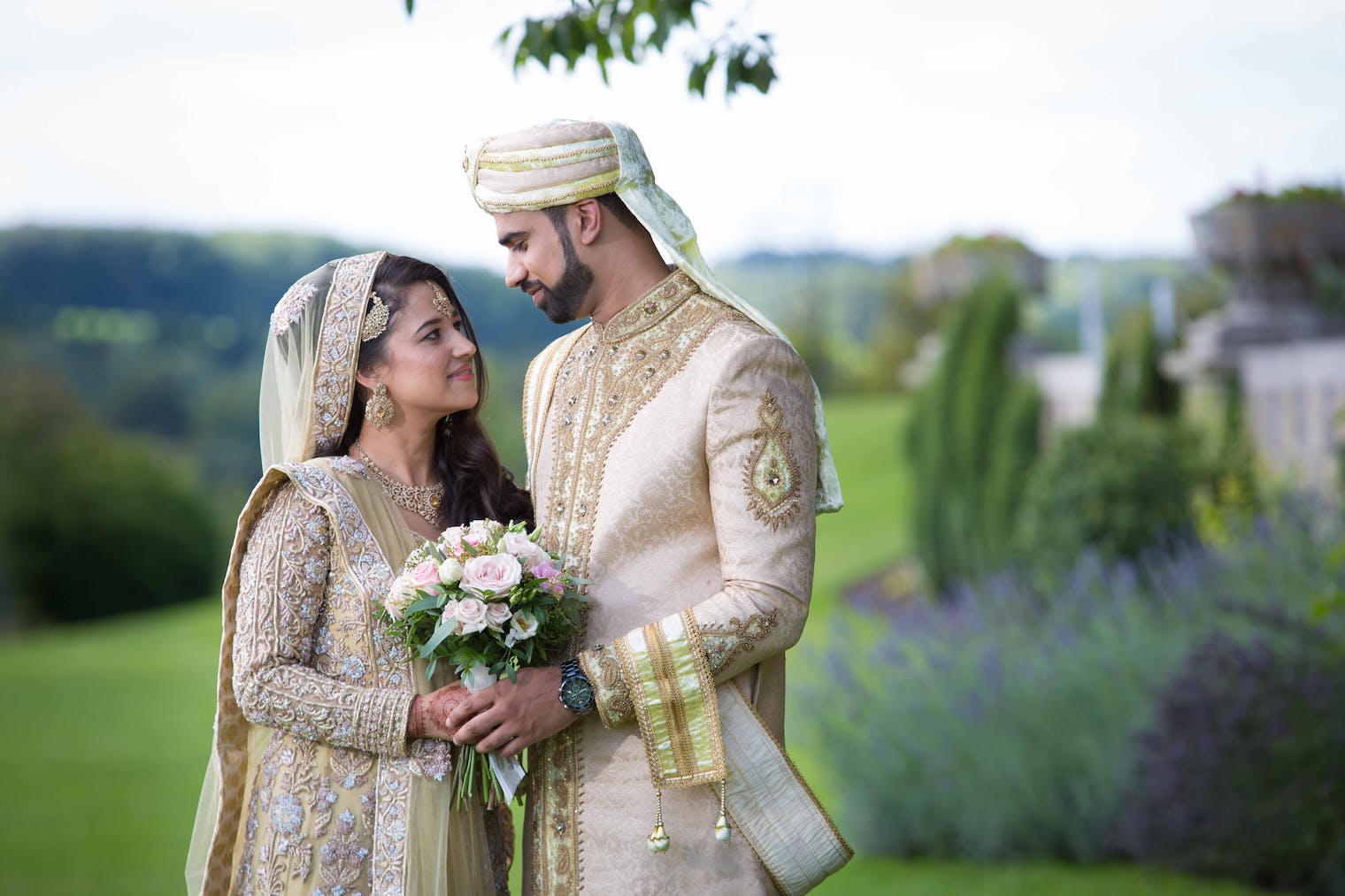
Muslim wedding ceremonies are intimate and romantic, and also filled with incredible rituals and traditions that make them wonderful and joyous occasions.
If you’re planning your own ceremony, you might not be sure where to start. Who do you ask to arrange one? Does a ceremony contain a religious service? What’s the order of a Muslim wedding ceremony? What traditions do you want to include and which might you want to adapt?
And, did you know that Muslim wedding traditions vary depending on region?
There are so many questions that if you’re planning your own wedding ceremony it can be complicated and confusing. However, the good news is that it doesn’t have to be. We’re here to answer all of the common questions and make your wedding planning a breeze.
So, in this post, we’re going to go into detail about everything to do with Muslim wedding ceremonies, from how long they last to what happens before, during and after.
For more information about different wedding ceremonies around the UK and beyond, read our ultimate wedding ceremony guide.
What is a Muslim wedding ceremony?
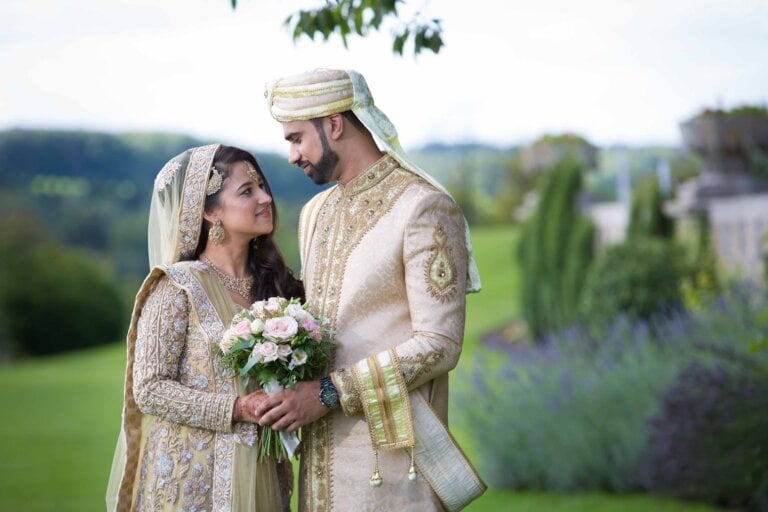
A Muslim wedding ceremony, also known as a nikah, is when a Muslim couple comes together to get married. The ceremony is filled with traditions and rituals, including readings from the Qur’an.
Traditionally, the bride doesn’t need to be present at the nikah so long as she has previously given her express consent and permission. However, in many modern ceremonies, the bride often chooses to be there to share in the celebrations and spend time with her new husband.
What date should you have a Muslim wedding ceremony?
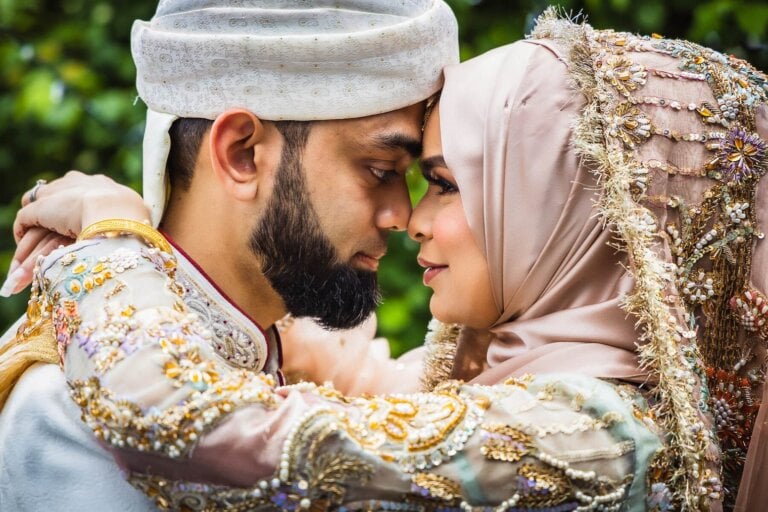
A Muslim wedding ceremony can take place on any day except for the two days of Eid, known as Eid al-Fitr and Eid al-Adha.
What time does a Muslim wedding ceremony take place?
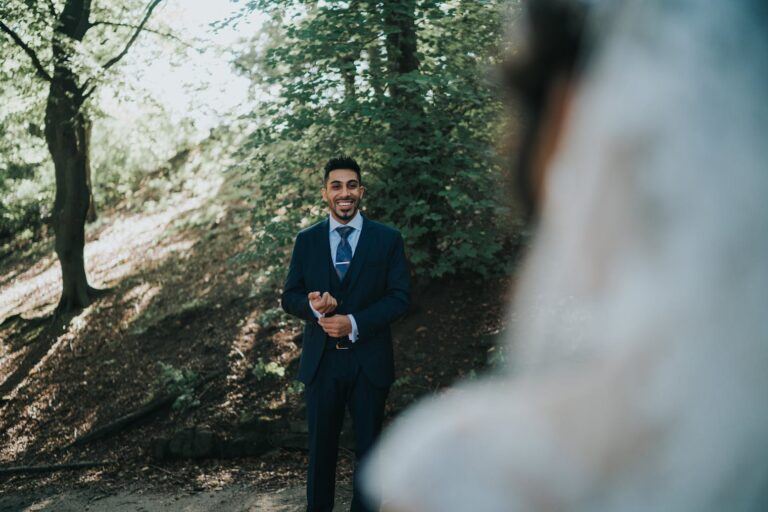
There are no specific times for when a nikah should take place. However, it’s common for a nikah to begin around lunchtime, to ensure there’s still plenty of time for the Walima, which is a celebratory feast that usually takes place afterwards.
Is it common for Muslim weddings to include a religious service?
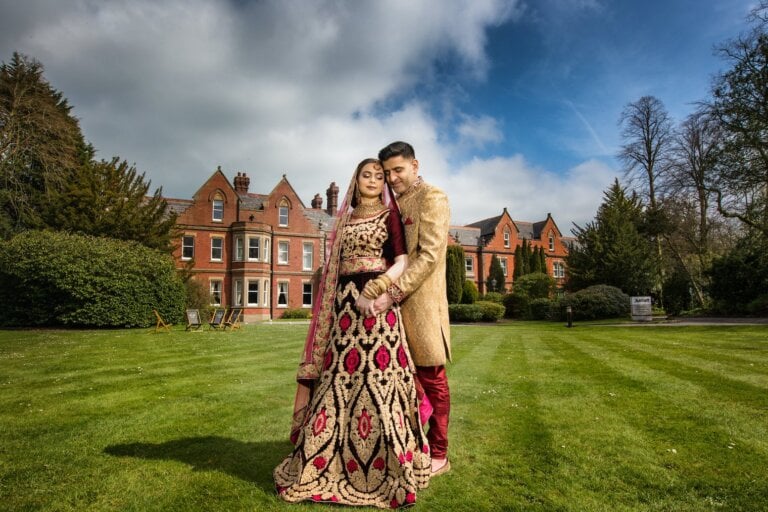
Yes, during the nikah there are many religious rituals and a sermon, which includes readings from the Qur’an.
How popular are Muslim wedding ceremonies?
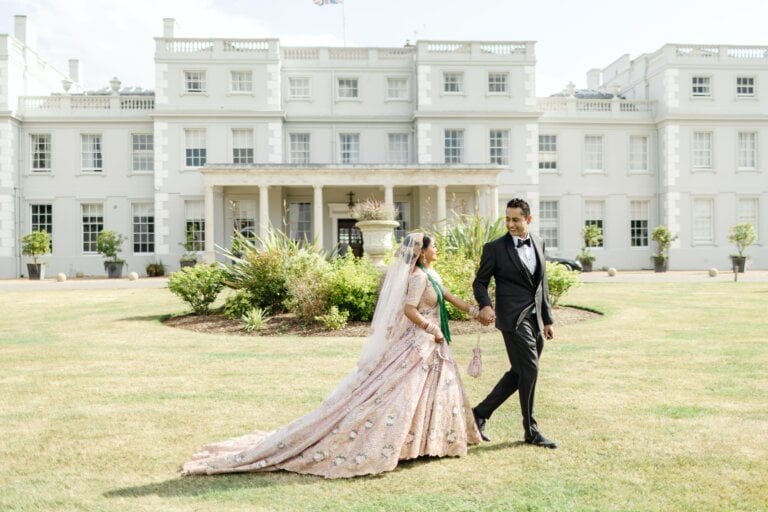
As you might assume, Muslim wedding ceremonies are popular within the Muslim community. You can only get married in a nikah if both the bride and groom are Muslim.
What type of couples usually choose a Muslim wedding ceremony?
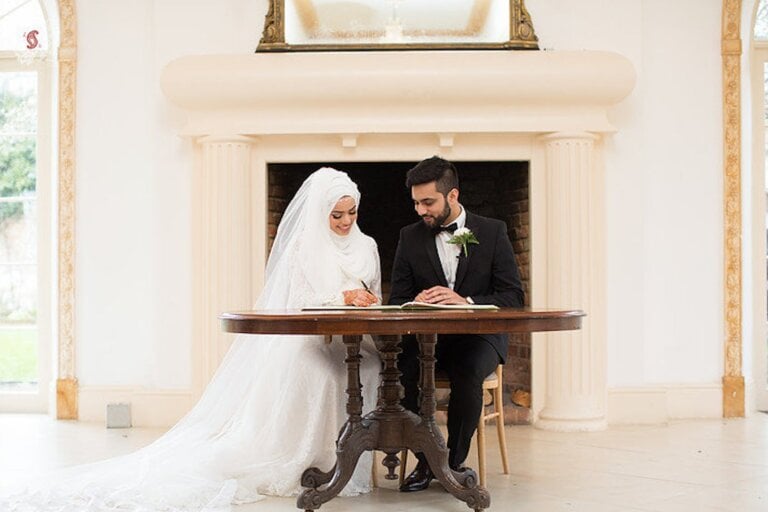
Because a nikah is so closely tied to Islam, only couples who are Muslim will choose to have a Muslim wedding ceremony.
Are Muslim weddings expensive?
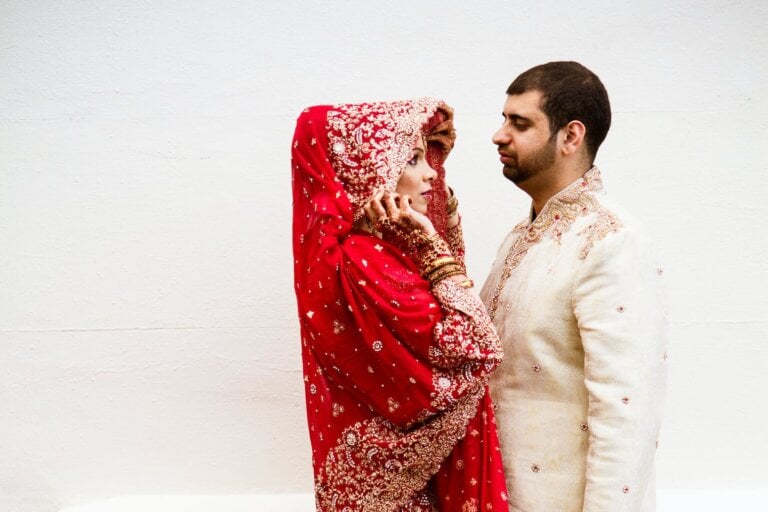
In the UK, the average cost of a wedding is £19,184, which is relatively in line with the average cost of a Muslim wedding. However, a wedding only needs to be as expensive as your budget allows. It’s more than possible to have a fabulous Muslim wedding for around £4,000 or less. At the same time, for a truly extravagant wedding, you might spend £35,000 or more.
If you’re planning a Muslim wedding but looking to keep costs down, read our guide on how to save money on your wedding for plenty of cost-cutting tips.
How do Muslim wedding ceremonies vary across the world?
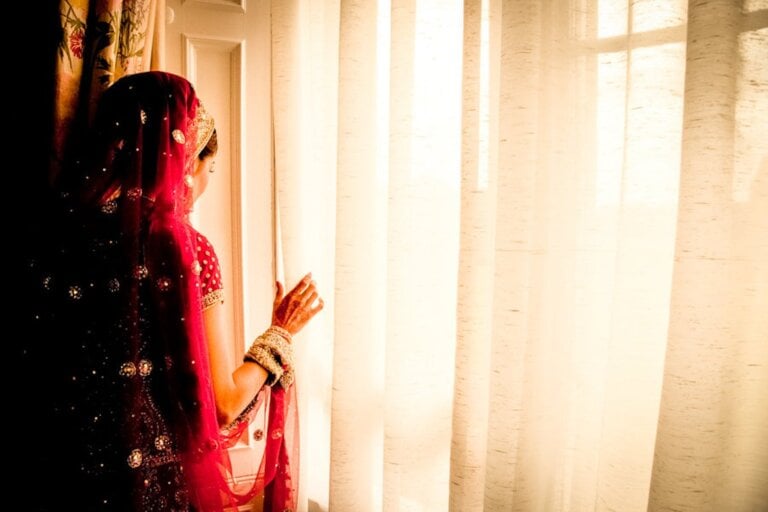
Islam is the second-largest religion in the world and spans different cultures and continents. This means, much like other religions, there are variations depending on which region you’re in.
For example, in Middle Eastern Muslim weddings, the bride is presented to the groom, while in South Asian Muslim weddings, the groom is presented to the bride. Similarly, in the Middle East, the Walima is the main post-ceremony celebration, while in South Asia there are two: the Shaadi and the Walima.
Who officiates a Muslim wedding ceremony?
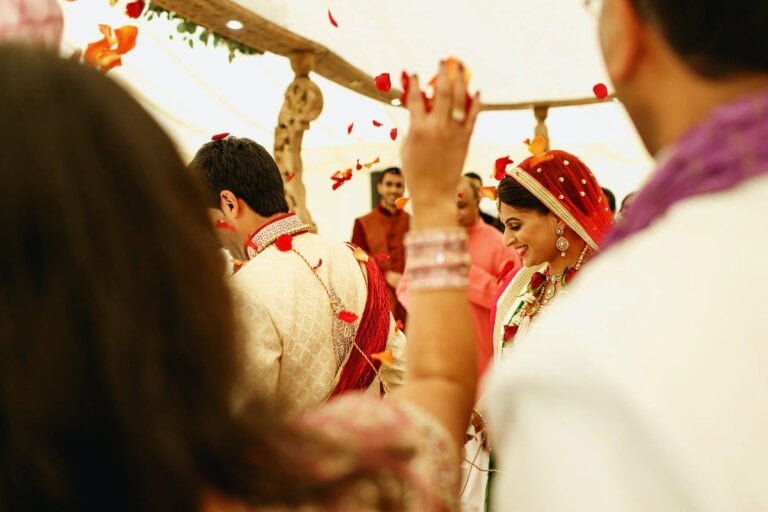
A nikah is usually officiated by an Imam, who is a Muslim cleric, or sometimes a Qazi, an Islamic judge.
Is a Muslim wedding legally binding?
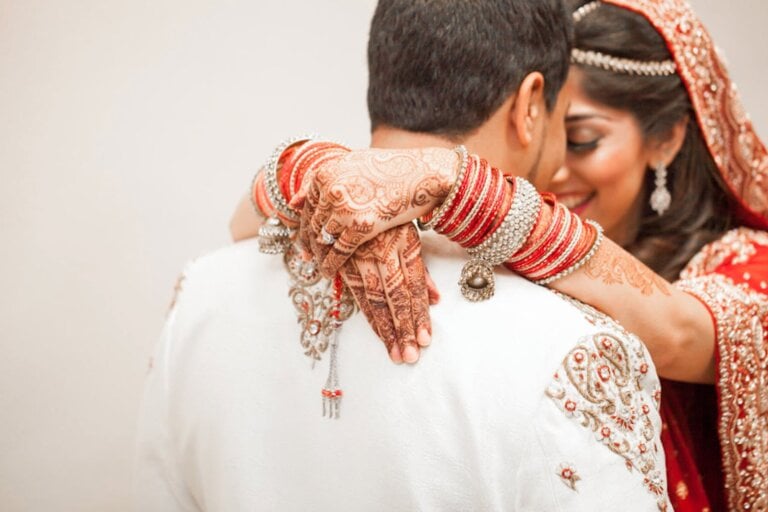
In the UK, a couple who get married in a nikah are married in Islamic law, but aren’t married under UK law. To have a legally recognised marriage, the couple must also have a legal ceremony at a registry office.
Where are Muslim wedding ceremonies held?
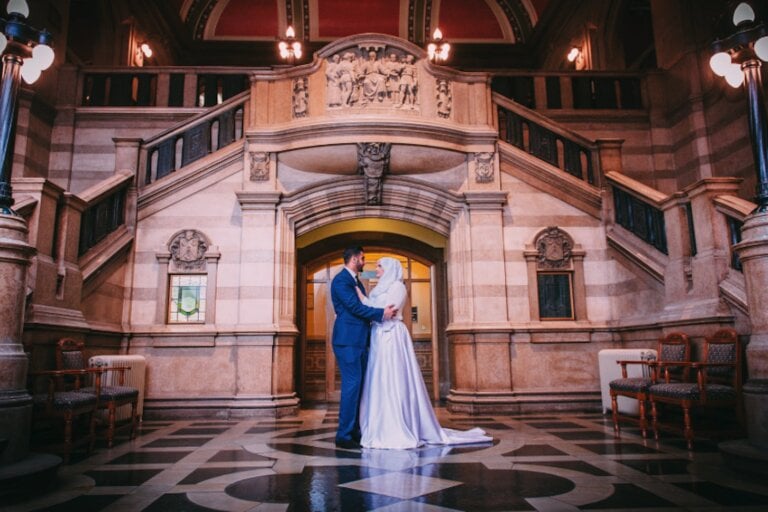
Couples have a wide range of options when it comes to where their nikah might take place. The traditional choice of venue is a mosque, the Muslim place of worship, before moving on to a separate venue in the afternoon and evening for the Walima.
Other couples may choose to get married in different venues, such as a home, hotel or venue space.
How long are Muslim wedding ceremonies?
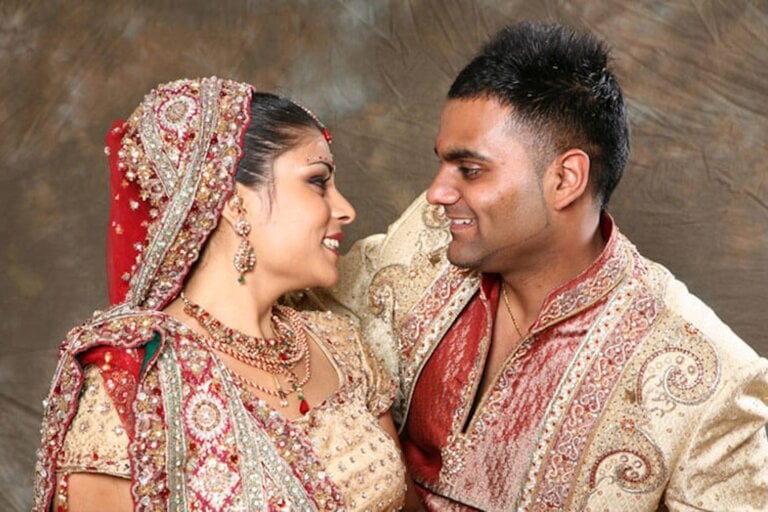
The nikah will usually last between 30 and 45 minutes, though this can vary depending on the Imam and the number of traditions the couple chooses to incorporate into the ceremony.
Read our guide to how long wedding ceremonies take for more information about the length of different wedding ceremonies.
What words are exchanged at a Muslim wedding ceremony?
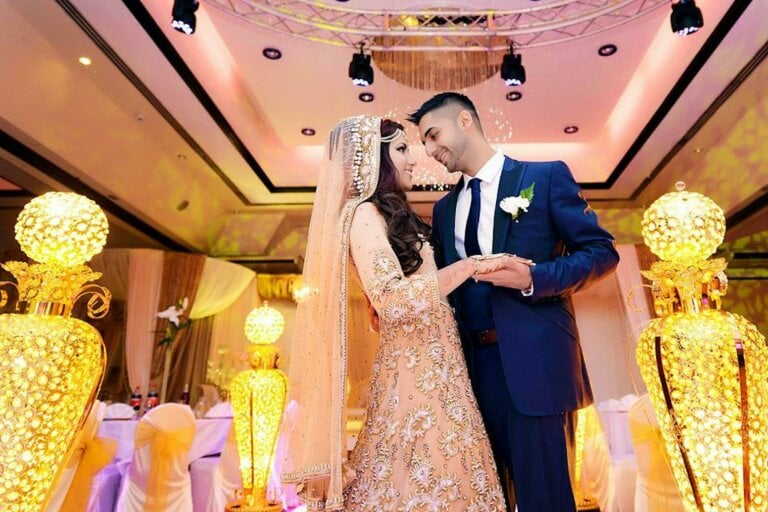
Traditionally, at the nikah, there aren’t many words exchanged between the bride and groom, including vows. Some couples may choose to include vows in their ceremony, but the main word spoken by the couple is the repetition of the word qubool, which means I accept.
If the couple has chosen to exchange vows, there are no legal declaratory or consenting words, so they’re free to be as personal as they like.
Do men and women sit apart at a Muslim wedding ceremony?
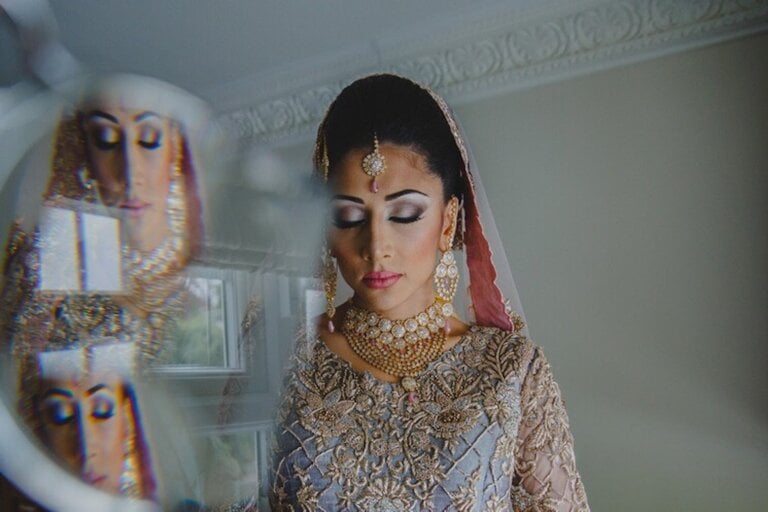
Traditionally, men and women will sit apart at a nikah. In some ceremonies, the men and women may even sit in separate rooms.
However, this all depends on your beliefs, culture and preferences. Many modern nikah take place with no gender segregation.
What traditions are there at a Muslim wedding ceremony?
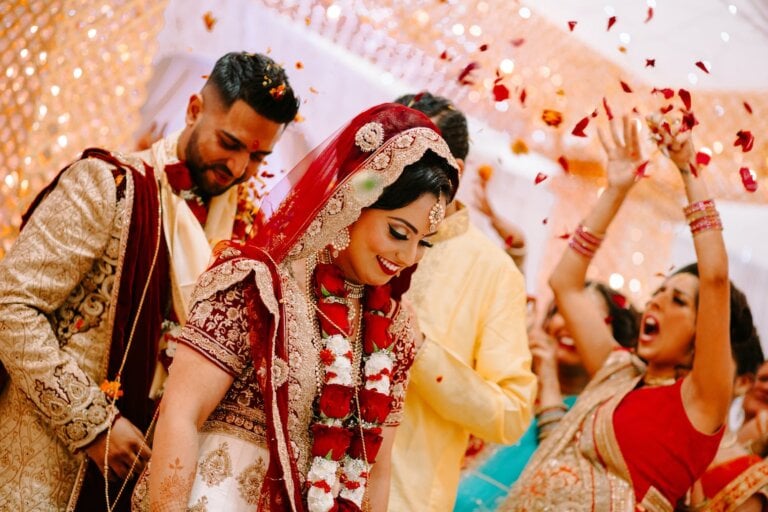
As we’ve already highlighted, there’s a wide range of traditions that take place during Muslim wedding ceremonies. These traditions also differ depending on where in the world you’re from. Below are just some of the most popular nikah traditions from different regions.
South Asian nikah traditions
- Mehndi. A pre-ceremony event that brings the bride together with female guests who will design henna patterns on the bride’s hands.
- Reading from the Qur’an. The first chapter of the Qur’an is read, called Surah Al-Fatihah.
- Arsi Mushaf. A mirror is held between the bride and groom so the groom can see his bride’s face.
- Baraat. Traditionally, the groom enters the ceremony on the back of a white horse. However, many modern-day grooms choose a car or carriage.
- Joota Chupai. A fun tradition that involves guests hiding the groom’s shoes and holding them until the groom pays a fee.
Middle Eastern nikah traditions
- Tolbe. Before the ceremony, the groom asks the bride for her hand in marriage, which is known as the Tolbe.
- Maher. The Maher is a gift given by the groom to his bride as a gesture of respect and to mark her independence.
What do you wear at a Muslim wedding?
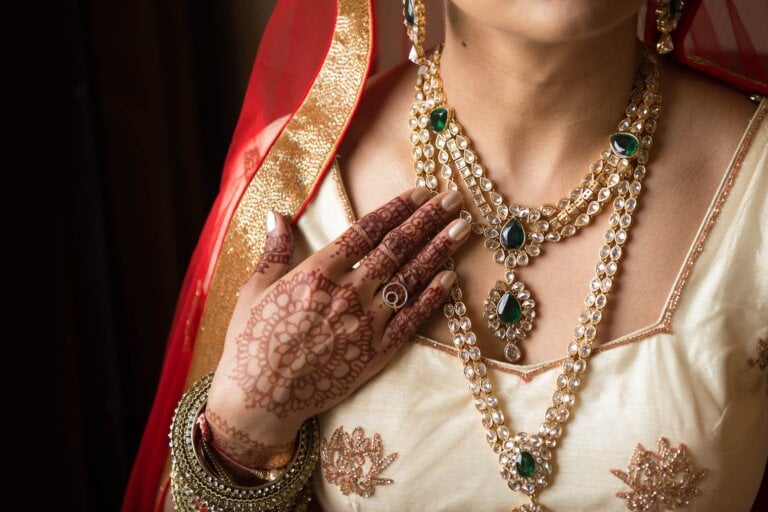
Traditionally, a Muslim groom would wear an embroidered kurta, a collarless tunic, with pyjamas or churidars. At modern Muslim ceremonies, the groom may choose a sherwani, a long-sleeved coat.
Muslim brides will traditionally wear a salwar kameez, a beautiful combination dress, with a dupatta to cover her head. Other brides may choose to wear a saree or scarf to cover their head.
Guests are expected to dress modestly and avoid bare arms. If the nikah takes place at a mosque, guests will also be asked to remove their shoes as a sign of respect.
What is the order at a Muslim wedding ceremony?
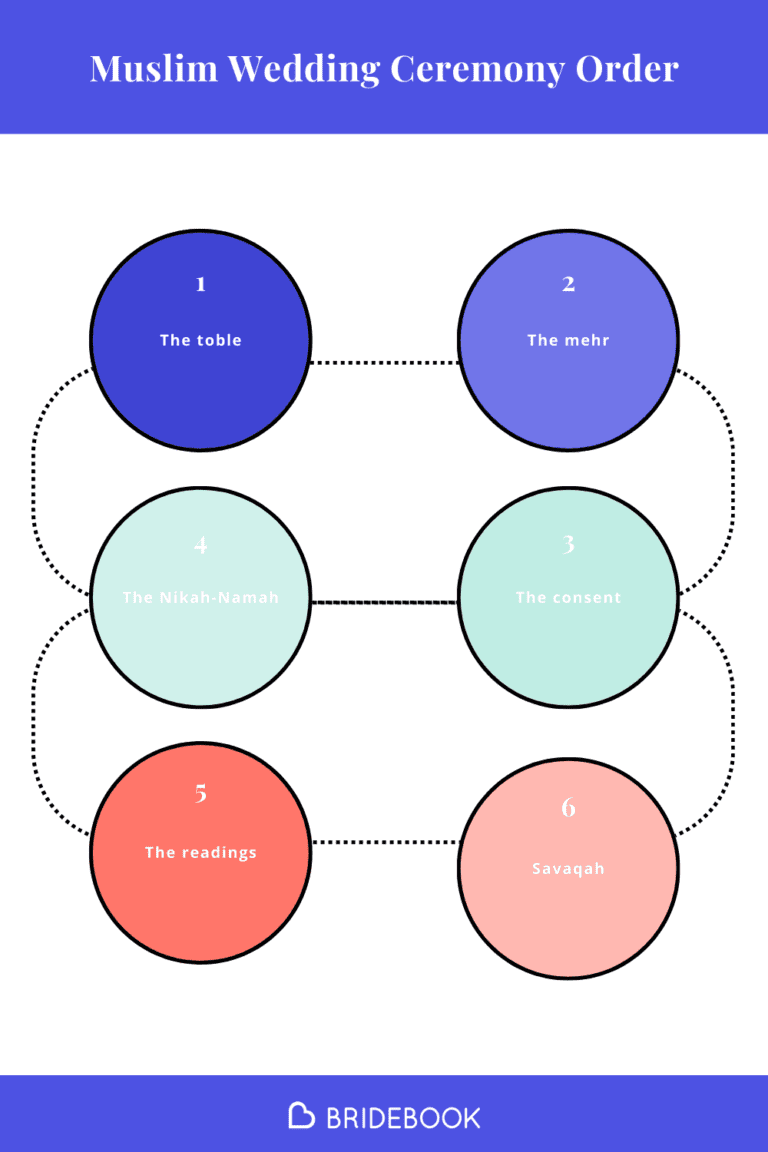
A nikah usually sticks to a relatively set order, so you’re likely to find that any Muslim wedding you attend will follow the same sort of structure. They do allow for some personalisations, but not as many as other types of wedding ceremonies.
Nikah will follow an order that resembles the following:
1. The tolbe
Ahead of the ceremony itself, the tolbe takes place. This is a short meeting between the groom and the bride’s parents when he asks them for permission to marry their daughter. After receiving permission, everyone joins in saying a prayer called Surah Fatiha.
2. The mehr
A little bit like a traditional dowry, the mehr is a gift given to the bride by her groom. Many brides consider an engagement ring to be the mehr, but if not, she’ll be presented with a gift or money before the ceremony.
3. The consent
The bride and groom are asked three times about whether they consent to the marriage. Each time, they must say qubool hai, which means I accept.
4. The Nikah-Namah
The Muslim marriage contract is called the Nikah-Namah, which the bride and groom both sign. It’s then read aloud by the officiant so all the guests can hear the promise they’re making to each other.
5. The readings
The officiant will read verses from the Qur’an in a short sermon. This is the point when the bride and groom are declared married.
6. Savaqah
The final part of nikah is Savaqah, when gifts are given. This includes throwing money at the bride.
For more information about orders at different types of wedding ceremonies, read our guide to wedding ceremony orders.
How do you book a Muslim wedding ceremony?
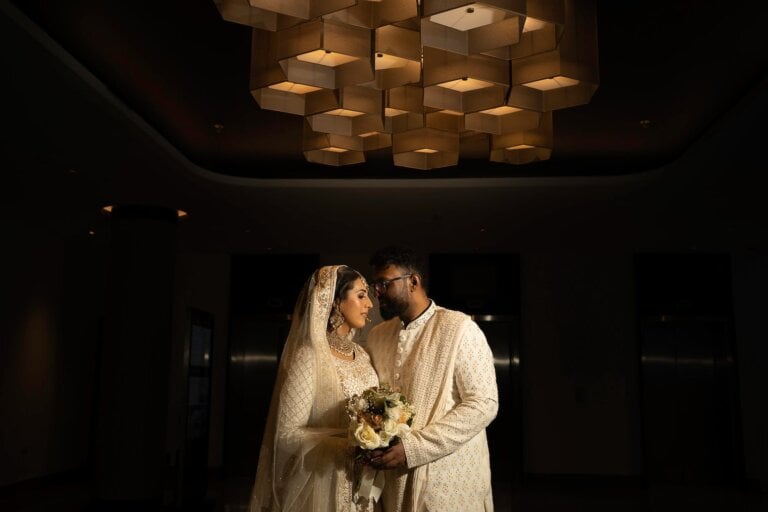
Once you’re engaged and looking to plan your nikah, speak to the imam at your local mosque. They can work with you to decide on a date that’s available so you can begin to plan everything else around it, such as a venue for the Walima, transport, decor, flowers and more.
Who plans a Muslim wedding ceremony?
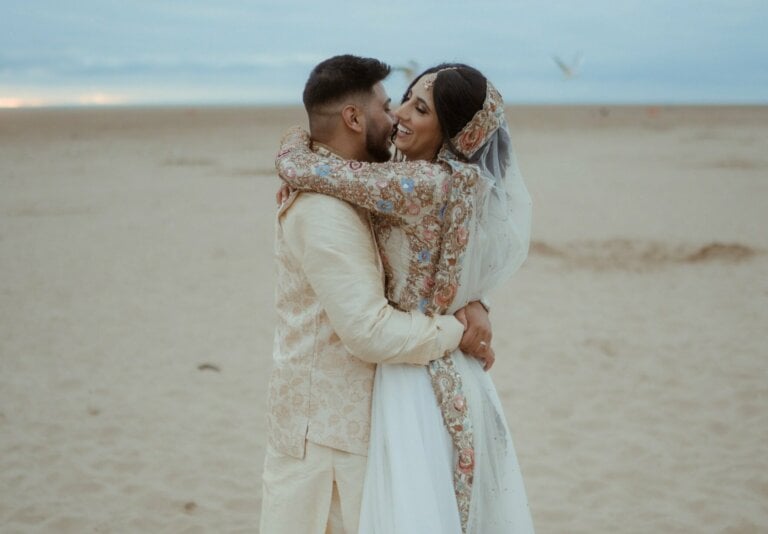
Traditionally, the parents play a heavy role in planning a nikah. However, many modern Muslim couples like to plan their own wedding, but still welcome input and suggestions from both sets of parents.
Alternatively, you may want to hire a wedding planner, who can take a lot of the work from you. See our post showcasing our Muslim wedding specialists to discover venues and suppliers who specialise in Muslim weddings.
What comes after a Muslim wedding ceremony?
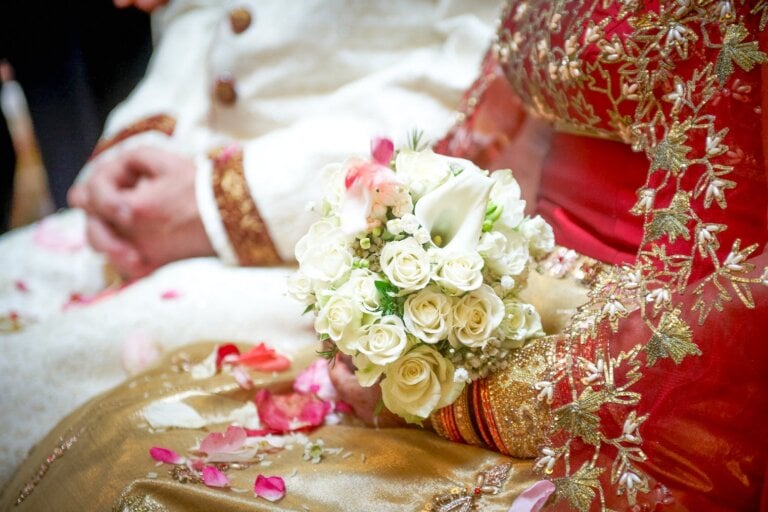
Traditionally, after the nikah, the bride and groom will join their guests at the Walima, which is a celebration in the same vein as a reception at other types of weddings. However, a Walima often lasts a lot longer than other wedding celebrations, with some lasting up to two days.
Often, the Walima will happen immediately after the nikah, on the same day. Sometimes, though, depending on your preferences and circumstances, it could take place a day or two later.
Plan your wedding ceremony with Bridebook
Looking to plan your own nikah? Sign up to Bridebook and get access to everything you need to plan your dream celebration.
Browse other similar articles…
- The Ultimate Wedding Ceremony Guide
- The Ultimate Wedding Ceremony Order
- The Best Wedding Day Timeline
- How Long is a Wedding Ceremony?


